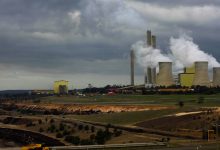A Liberal party aligned think thank has called on the Morrison government to offer compensation for coal-fired power stations that agree to close by an agreed deadline, in a move the group says will help manage and even fast-track the inevitable phase-out of coal power.
The plan has been put forward by the Blueprint Institute, a relatively new think tank formed by a group with close ties to key moderate Liberal-National party members. The group was founded by a former adviser to now ex-Foreign Minister Julie Bishop and features a number of former moderate-Liberal ministers on its ‘strategic council’ including Christopher Pyne, Robert Hill, Bruce Baird and Wendy Machin.
In a new report, titled ‘Phasing down gracefully’, the group says the introduction of a ‘Coal-Generation Phasedown Mechanism’, which would compensate coal-fired power stations that offer to close down for the loss of expected future profits. By offering the compensation, the group says the mechanism could bring forward the closure date of several coal plants, reducing Australia’s emissions compared to a scenario where the plants were allowed to run for the remainder of their operational lives.
The Blueprint Institute has recommended the creation of a competitive reverse auction process, designed to allow coal-fired power stations operators to specify what level of compensation would be necessary to allow the plants to close by an agreed date, providing certainty about when the power stations will close. The auction process would be administered by the Clean Energy Regulator, which already runs reverse auctions for the purchase abatement under the Emissions Reduction Fund.
The group says the plan could cut Australia’s emissions by as much as 390 million tonnes, including a halving of electricity sector emissions by 2030, and would provide an opportunity for Australia’s coal-fired power stations to exit the market over the next decades without causing unnecessary disruption to energy markets. By bringing forward the closure of ageing coal-fired power stations, the group suggests the compensation paid would represent good value for money for the emissions reductions achieved.
The report highlights a potential solution to the growing fight within the Liberal-National coalition on climate and energy policy, with the more moderate wing of the party seeing opportunities to embrace new investment and job creation in clean energy industries, while a more conservative wing has rallied behind the coal and gas sector.
Each of the Liberal state governments, in New South Wales, South Australia and Tasmania have introduced ambitious plans for supporting investment in new clean energy projects, but the Morrison federal government has said that it was wary of any policies that brought on the early closure of coal-fired power stations. But the Blueprint Institute has said that such an approach doesn’t address the inevitability of most coal plants closing over the next few decades irrespective of federal government policy.
“The status quo is clearly untenable. Ignoring the problem won’t make it go away—indeed, that will only make it worse.” CEO of Blueprint Institute Harry Guinness said. “What everyone involved—workers, communities, consumers, generators, investors—has long desired is the certainty that comes from national leadership. It isn’t about ending coal-fired generation—the plummeting cost of renewables and state policies to push them into the grid have already made that decision.”
“But the last thing anybody wants is an uncontrolled detonation. The Commonwealth’s role is to coordinate an orderly phasedown at minimum economic cost, and to ensure that cost is shared fairly”, Guinness added.
The group said that decarbonisation of the economy would be inevitable and that the earlier governments moved to facilitate that transition, the easier it will be for sectors expected to be impacted.
“Net-zero is inevitable, by 2050 or even earlier. To get there, our economy will need to undergo a tremendous structural transformation. That won’t happen by itself—but it will happen. And the longer we delay, the costlier it will be”, Chief Economist at Blueprint Institute Steven Hamilton said.
“Our 2030 emissions target, agreed to in Paris, is a critical milestone on the path to net-zero. Relying on the COVID-19 slowdown and uncoordinated state action only to fall short of our Paris target isn’t a promising start.”

The ‘Coal-Generation Phasedown Mechanism’ proposed by the group mirrors a mechanism introduced in Germany which offered compensation for coal power station operators that agreed to cease generating by a specified date.
The German mechanism has proven to be highly popular, with coal power station operators surprisingly eager to close their plants when compensation is offered, with the mechanism’s first round of auctions oversubscribed.
The recent auction will see almost 4,800MW of coal power station capacity decommissioned in Germany, with a total of EU$ 317 million (A$510 million) in compensation provided.







